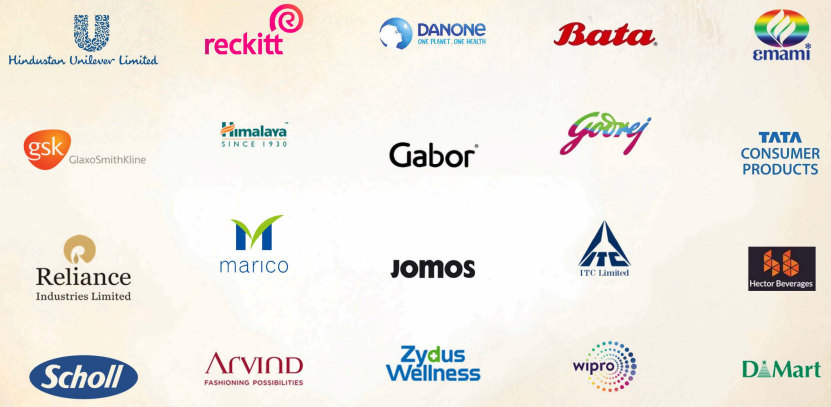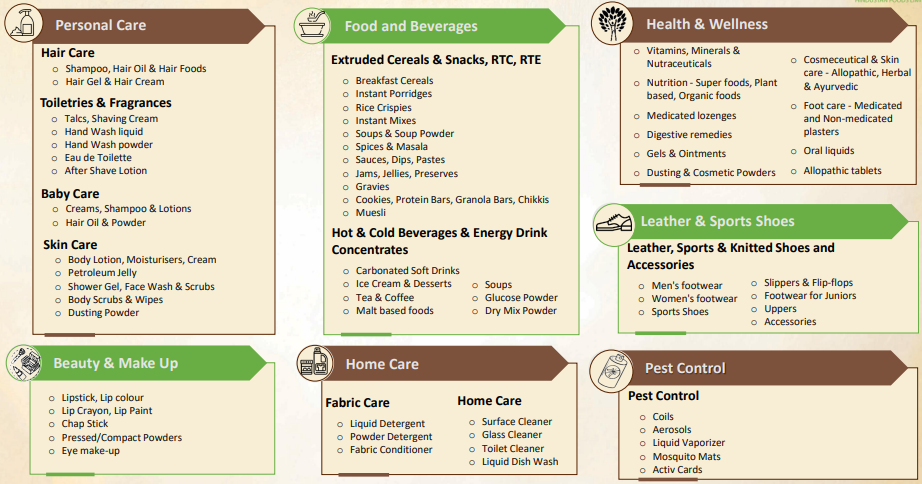Post GST, there has been be a complete overhaul of supply chain in a lot of sectors which was long pending. FMCG is one such sector in which for each branded company there are two businesses:
1. Manufacturing
2. Distribution (Brand businesses)
From an RoCE point of view the manufacturing business yields 18-20% whereas the brand business yields a minimum of 30%. During the VAT era, each state had a different tax rate for products, hence the location of the plant of the company was mostly decided according to which state government offers the best concessions. This led to development of a lot of plants of smaller capacities.
Post GST, this scenario has changed. Now capacities have been be set up according to logistical advantage rather than government concessions as obviously taxation is uniform all over the country. This has led to plants which are much bigger in size and most of the incremental capacities are being outsourced. FMCG companies would rather focus on creating innovative products and expanding their distribution, which is where the RoCE is high and the incremental RoCE’s are also higher, and let the boring part – manufacturing – be handled by someone else. Products sell on brand name and distribution rather than the formulation, hence the risk due to transfer of technical know-how is also low.
The boom in online sales and availability of VC funding has accelerated the emergence of new brands. New companies would also spend on creating products, marketing and distributing them rather than setting up a new manufacturing unit.
These changes are leading to creation of large players in the FMCG contract manufacturing space. One such player who is already benefiting due to this shift is Hindustan Foods Limited.
About the company :
Hindustan Foods (HFL) started in 1984 as a JV between GSK India and the Dempo group. It setup a facility in Goa to manufacture Farex. The performance over 3 decades had been subpar as the company was loss making due to low utilization of capacity and was funded by the Dempo group with personal loans which subsequently turned into equity. In 2013, the Vanity Case Group (VCG) bought a controlling stake in the company. VCG has around 3 decades of experience in contract manufacturing of various FMCG categories including Food, Cosmetics, Personal care and Home care products. Vanity case is headed by Mr. Sameer Kothari – a CA with an MBA from Cornell.
In 2014, VCG leveraged on its existing FMCG relations to enter into supply and manufacturing agreement with Danone and Pepsi (to manufacture Kurkure puffcorn). This instantly helped lift the turnover from 6 cr (annual runrate) in FY14 to 17.4 cr in FY15. In the same year the Dempo’s also wrote off loans of 11 cr advanced by them to HFL. VCG successfully turned around the company and could lift the turnover to 17.4 cr within a year leveraging on its existing relationships. In 2016, Mr. Nikhil Vora backed Sixth Sense Ventures along with the promoter VCG announced an equity infusion of ~32 cr. In 2017, the company used these funds for several acquisitions including pest control plant (Mortein) of Reckitt Benckiser and Ponds exports – shoes manufacturing plant of Hindustan Unilever (HUL). In 2018, the company acquired a shoe manufacturing plant in Mumbai, Setup and commenced a greenfield plant in Coimbatore (for manufacturing Tea, Coffee and Soups for HUL), and commenced process to merge a detergent factory (manufactures for HUL) held by VCG with HFL. In 2019, the company announced further equity infusion (~Rs 100 cr) from Convergent (~Rs 70cr) – a PE setup by ex CEO of Fairfax India, Harsha Raghavan and Sixth Sense Venture (~Rs 30 cr). The company used these funds to setup a liquid detergent plant in Hyderabad with a budget of Rs 150 cr. In FY19, the company acquired a 40% stake in ATC Beverages, a financially ailing company engaged in the manufacturing of soft drinks, juices and energy drinks. In FY2021, the company was asked to setup a facility for ice-cream manufacturing near Lucknow, Uttar Pradesh at a cost of Rs 125 cr. In FY22, the company announced its foray into the OTC Healthcare & Wellness segment by taking over Reckitt Benckiser Scholl India while it also forayed into cosmetics industry by acquiring AeroCare Personal Products LLP. So, in effect, HFL is widening its product portfolio to leverage on its existing relationships and start new ones.
FMCG Client Basket

BUSINESS MODEL :
HFL operates as a pure contract manufacturer and has maintained it wants to stay in the same business. Under contract manufacturing, the company segments its business in 3 types:
- OEM
Under this model projects are generally large in nature and require huge capex. The company either does a greenfield expansion or acquires the existing facility from the client. The company ensures that there are long term contracts in place before acquiring or setting up plants. This model can be further categorized into:A) Entire dedicated model: 1 UNIT = 1 CLIENT + 1 PRODUCT
In this model, the entire manufacturing facility is exclusively utilized for the client company. The location, layout, design, machinery, capacity and all other parameters of the unit are finalized and executed in complete concurrence with the client in this case. The investment, project execution and management of the facility is done by the company. The client guarantees the business for a minimum number of years and ROI. Some of the Company’s units under this model are:
Jammu (Reckitt Benckiser – Mortein – Vaporizer, Aerosol and Coils), Coimbatore (Unilever – Coffee [Bru], Tea [Taj Mahal, 3 Roses and Lipton]), and Hyderabad (Unilever – Detergent powder [Rin, Wheel & Surf].B) Anchor Tenant Model: 1 UNIT = 1 ANCHOR CLIENT + FEW SMALL CLIENTS + FEW PRODUCTS
In this model, the manufacturing facility is not dedicated entirely to a single principal company, but the capacity is shared by various companies for a longer period of agreement. The anchor tenant enjoys all the privileges of a principal, however there will be a few minor partners sharing the facility. This helps to spread the overheads and bring down the costs. The Goa unit of the company manufactures various extruded food products for various companies (Danone, Pepsico, Marico – Baby Food Products & Snacks – Farex, First Food, Easum, Kurkure Puff-corn) Contract Manufacturing
1 UNIT = MANY CLIENTS + MULTIPLE PRODUCTSContract Manufacturing is a process of outsourcing a part or the whole manufacturing process of a product to a third party. For the company under this model, the manufacturing units are utilized for various client companies in order to manufacture part of their requirements. These contracts are typically for seasonal clients, product testing and smaller companies without manufacturing capabilities. The contracts are not long-term and are flexible in nature, in terms of volume, product categories and size. Competitive products are made in the same facility. This is the business with higher margins as the business involves multiple clients with small volume. Customization of product also adds to the margin. Higher share of this segment going forward can lead to higher margins.
3. Private Labels
YOUR CONCEPT + OUR EXPERTISEPrivate label is the process of taking a manufacturer’s formulation and designing and adding the brand’s name and logo to it. This model offers several customizable options and requirement levels at competitive prices and is based on extensive research and testing methods. HFL is responsible right from the procurement of raw materials, development to the packaging of the products. Under this model, HFL owns the product formula made for these private labels and the focus is to ensure that customers are provided with complete turnkey private labeling solutions. The company has expertise in developing foods, beverages, leather products and pest control products for private labels by utilizing its skilled team of designers in conceptualizing the product’s unique corporate identity.
Product Portfolio

Key Points
The best point about the OEM model is long term contracts (7+ Years) and guarantee of ROI by principal. Also, any debt for the project is covered in this contract, hence, if principal fails to utilize the capacity, they are liable to pay. All investment decisions at HFL are taken only if RoCE is above 15% while the RoE should be at least 18%.
Mergers with group companies via stock deals (mostly) rather than cash deals will help keep promoter interest aligned with that of minority.
Key risks in this case is project execution and any significant blunder in manufacturing. Other risk is equity dilution. Company has kept on raising funds as and when opportunity for setting up plant has arisen. This model makes sense only when profit growth is higher than change in outstanding shares.
Aggressive capex over the last 3 years
HFL has expanded the size of its business aggressively with prime execution capability. They have expanded their gross block of assets from INR 77 cr as on FY19 to INR 708 cr as of Q2FY23 at a CAGR of over 74%. This increase has been a mix of greenfield and brownfield expansions along with acquisitions. They expanded capacities at their liquid detergent plant in Hyderabad, set up a greenfield plant in Silvassa and Coimbatore, invested in ATC Beverages (to expand their product portfolio to soft drinks, juices and energy drinks), set up a dedicated ice cream manufacturing plant in UP, acquired a colour cosmetics manufacturing company, to name a few.
Way Forward
The last 3 years have been operationally very strong for the business, and we expect healthy sales growth over the next few years with investments being made into newer, higher margin product categories. HFL has completed the acquisition of the extremely sticky colour cosmetics business with an investment of INR 30 cr in AeroCare Personal Products LLP. At the start of this year they also announced their foray into the higher-margin, fast-growing, OTC Health & Wellness category with the acquisition of Reckitt Benckiser Scholl India, an export oriented unit doing ~INR 100 cr in sales. This unit manufactures footcare products. HFL is expanded its Food & Beverages portfolio by setting up an Ice Cream plant in Uttar Pradesh with a capex of INR 125 cr and have received board approval for a Rs 75 cr expansion which is expected to be complete by Q4FY23. HFL is also setting up a Home & Personal Care plant in Hyderabad with INR 150 cr capex which is expected to be complete by Q1FY24. HFL is targeting revenues of Rs. 4,000 cr by FY25.
We expect consolidation in FMCG contract manufacturing going forward as companies shift their focus to marketing and distribution channels. HFL will be a direct beneficiary of this trend as it is one of the leading FMCG contract manufacturers in India. The Company finances their new projects from internal accruals and debt thus over time we expect more investments to be made for capacity expansion which will lead to higher profitability and better operating leverage benefits.
